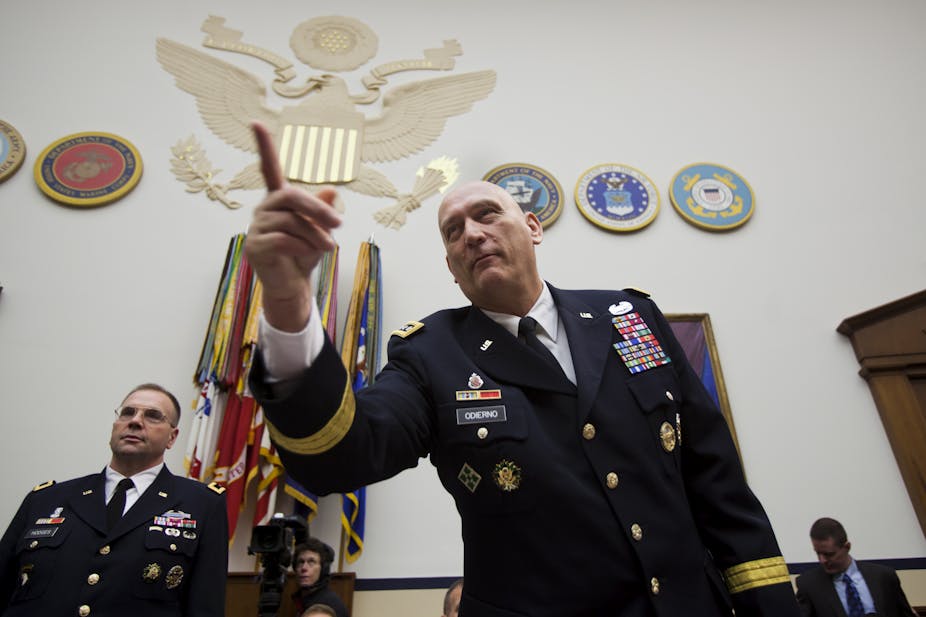Raymond Odierno, head of the US Army, has revealed that he has concerns about the UK’s commitments to defence and international security, telling the Daily Telegraph that cuts to the UK defence budget have made him doubt its ability to fulfil its commitments to the US as a military ally.
British defence has indeed been hit hard by austerity, even as the wars in Afghanistan, Iraq and elsewhere continued. Our research shows that while the Royal Air Force and the Royal Navy have fared better under austere circumstances, it has been the British Army that has been hit hardest. Odierno, it seems, is tapping into this problem and the UK should take note.
The NATO target
Falling defence budgets are in no way unique to the UK. European military expenditure has been steadily decreasing since the 2007-8 financial crisis. The average spend on defence among Europe’s NATO members is about 1.6% of GDP, while the US contributes more than 75% of all NATO defence expenditure. The NATO-set target of spending 2% of GDP on defence is currently only met by a small number of the 28 Allies. Odierno appears to have been referring to this target when issuing his warning about the UK.
The 2% target was recognised at the political level for the first time in 2014 through the North Atlantic Council Summit Declaration but NATO members were given a 10-year window to increase their spending and the language used to seal the deal was far from concrete. The chances of them actually meeting the target under these conditions are debatable.
The UK was a strong supporter of the 2% target, and has urged its allies to commit to it. But it is now likely to fall below the 2% target itself for the first time when the government carries out its next review of defence spending this year.
In fact, if the UK stays on its current trajectory its defence budget would be the smallest it has been for 25 years – never mind meeting 2% of GDP.
It is unrealistic to expect many European nations to meet the NATO 2% target, for political, economic and historical reasons. Germany, for example, would have to spend an extra €37 billion to hit the target. And doing so would make it the leading defence spender in Europe – something the UK and France may find slightly disconcerting.
But given the UK’s traditional role as a leading player in NATO and a key operational partner to the US, dropping below the 2% mark is a worry.
Capacity and influence
Odierno has warned that if the British Army doesn’t keep up with spending, it will no longer be able to send its own divisions into conflict zones – only smaller brigades that would operate inside US divisions.
On one hand, this isn’t necessarily a major blow. Countries such as the Netherlands, Denmark and Spain have all considerably reduced the size of their armies. Now that modern warfare is fought more from the air (and the sea) rather than on land itself, the need for large standing armies becomes arguably unnecessary and expensive.
On the other hand, the loss of division command raises bigger problems. The UK has always been recognised as setting the standard of transatlantic burden-sharing but with a smaller budget, it would have less say at the overall strategic and operational levels.
What’s more, operating as part of a multi-national division can be difficult. Research suggests that multi-national units remain sub-standard to single nation commands. Whether this is because of language, military procedure or culture is unclear but the effect is the same.
The British Army is grappling with a shrinking level of regular, professional combat soldiers as it transforms to a larger reserve force and it is looking less and less likely that it will be able to maintain the 2% NATO target after 2016.

The impact of austerity on the defence budget will no doubt lead to difficult decisions having to be made. Does the US really want the UK to retain a first class Trident deterrent, or would it rather see that money spent on more conventional capabilities such as personnel?
Many might think that the US is using the impending British election to direct future defence spending in the UK, although this is a mantra that has been coming from Washington since the NATO alliance first formed. Regardless, there may be wisdom in Odierno’s words. There are benefits to commanding from the front rather than marching behind.

